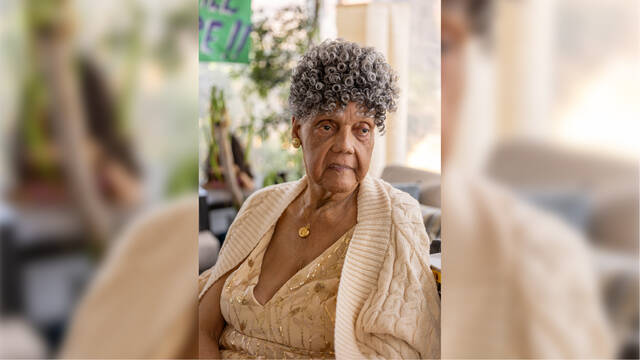Miss Major Griffin-Gracy, an early activist for transgender rights and one of the protesters in the Stonewall Inn riots that sparked the modern movement for LGBTQ+ equality, has died. She was 78.
Miss Major, as she was known professionally, died on Oct. 13 in the comfort of her home in Little Rock, Arkansas, surrounded by loved ones. Her death was announced by House of gg, the nonprofit educational and historical center she founded.
No cause of death was provided.
Born in Chicago on Oct. 25, 1946, Miss Major fought for more than 50 years for the rights of trans people, those who are gender nonconforming, and the broader LGBTQ+ community – especially for Black trans women, trans women of color and those who have survived incarceration and police brutality.
“Being transgender is not the road to hell,” she said during an interview with USA TODAY earlier in 2025.
Miss Major, known as “Mama” to many, was assigned male at birth but knew from an early age that her true gender was female, although she didn’t always have the words to express it. She wrote about the experience in her 2023 memoir, “Miss Major Speaks: Conversations With a Black Trans Revolutionary,” written with Toshio Meronek.
She graduated from high school at age 16 and entered college in Minnesota, but ran into trouble for dressing in female clothing. In 1962, she moved to New York City, where she worked briefly in a hospital morgue and performed in drag shows, including the Apollo Theater’s famous Jewel Box Review. To survive, she became a sex worker, an experience she spoke about openly.
Miss Major was among the patrons of the Stonewall Inn, a popular gay bar in New York’s Greenwich Village, who fought back when police raided the establishment in the early morning hours of June 28, 1969. Police claimed they were investigating the illegal sale of alcohol, but raids on gay establishments were common at a time when homosexuality was not widely accepted.
Transgender people were particularly targeted for harassment, Miss Major said in the USA TODAY interview, recalling the night of the raid and the ensuing rebellion, now regarded as a watershed moment in LGBTQ+ history and American history.
“They were just rude,” she said of the police at the premises during the raid. “They put their hand where it didn’t belong. They shoved (transgender people) and pushed them around, and then they didn’t help us when we had to go up the steps to the paddy wagon.”
Spectators watching the rioting from the windows of nearby apartments shouted words of encouragement to the queens who were fighting back against the police, she said.
“You heard people in the buildings around there yelling out their windows at the girls beating the police up,” Miss Major said. “Some people yelled out, ‘Go get ’em, girls!’ The fact that we were attacking the police was a big deal.”
In the years that followed, Miss Major often argued that trans Americans’ involvement in Stonewall has never been fully acknowledged.
“The gays and lesbians have taken over – it became their riot,” she told USA TODAY. “For years, I didn’t have anything to do with it because I thought they had overshadowed us.”
Kierra Johnson, president of the National LGBTQ Task Force, described Miss Major as “a mentor, a sacred inspiration, a strong, brilliant and resilient Black woman who kept it real.”
“There will never be enough words to fully describe the impact Miss Major had on the LGBTQ+ people, on leaders across movements, on those she loved and were touched by her work and her words,” Johnson said. “She was a revolutionary, a visionary, a legend – a foundational mother of our movement and an inspiration to those fighting for liberation.”
Miss Major spent time in men’s prisons and mental hospitals in the early 1970s after she was arrested on a robbery charge. In prison, she was often severely mistreated. In one of them, however, she met Frank “Big Black” Smith, one of the leaders of the 1971 rebellion at the Attica Correctional Facility in New York state. That experience, she said, turned her into a political person.
Upon regaining her freedom, she became an advocate for incarcerated trans people, especially trans women housed in men’s prisons and those who have survived police brutality. She was the first executive director of the Transgender Gender-Variant and Intersex Justice Project, a role she held until she retired in 2015. In that capacity, she often visited trans prisoners and became a mentor to them.
In the 1980s, Miss Major became involved in addressing the AIDS crisis, first in New York. After moving to San Diego with her son Christopher, she started a home health care agency, Angels of Care, to assist people with the disease. She lost a partner, Joe-Bob Michael, to AIDS in 1995.
After relocating to San Francisco, she became a health educator with the Tenderloin AIDS Resource Center and pushed for the city’s first mobile needle exchange. She started a drop-in program there for trans people, called GiGi’s Place, and performed street outreach to those who weren’t comfortable with coming to the center.
In 2016, Miss Major moved to Little Rock and founded the House of gg, also known as the Griffin-Gracy Educational Retreat and Historical Center. The nonprofit serves as a haven for Black trans people and movement leaders in the southern United States.
“We are alive today because of her life, legacy and unwavering commitment to every member of our community,” said Shelby Chestnut, executive director of the Transgender Law Center. “Miss Major reminds us that we will always find ways to not just exist but thrive.”
Miss Major is survived by her longtime partner, Beck Witt; three sons, Asaiah, Christopher, and Jonathon; the many people she has mentored, including Janetta Johnson, her successor at the TGI Justice Project; and her sisters Tracie O’Brien and Billie Cooper.








